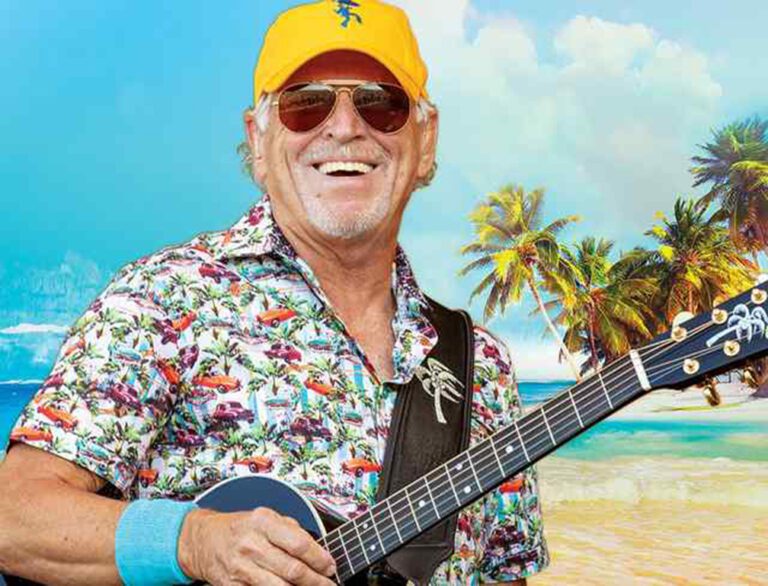Truck drivers navigating the interstates aren’t much different than other American workers. Every worker thinks often of reaching the next destination, of finishing the next run. Why? Because whether the job is delivering beans or counting them, everyone who works for a living looks forward to the same thing. With every successful haul, the worker bees of America are one step closer to the gift for a year’s toil – the vacation
When it comes to the music business, few performers have carried their listeners on more “vacations” than Jimmy Buffett. The man has a special talent for conjuring up images of full vacations in the span of a three-minute song.
The idea that Buffett’s entire life is a vacation is a myth. The performer, who has been on stage for more than half a century, has matured from his early years in the 1960s and ’70s. Back then, every Buffett song brought along a party. Over the years, he settled down and became wildly rich, based on his own myth.
Few would characterize Buffett as a “one-hit wonder,” but the reality of the phrase is closer to truth than to what his legions of followers — or “Parrotheads” — want to admit. Over the course of Buffett’s career, America’s most famous beach bum has released 67 singles.
Other than a 20-second guest spot on Alan Jackson’s “It’s Five O’clock Somewhere,” none have reached the top of the Billboard charts. Only a small handful have managed to make it into the Top 10. In fact, on the major Anglo record charts since 1969, Buffett’s singles have had the opportunity to reach No. 1 over 350 times. But all of the charts — U.S., Canada, and Mexico — show the music world has repeatedly rejected his work. He’s received little radio play over the course of his career. The reasons why aren’t easy to explain.
Buffett self-describes himself as an “adequate” musician with only a “fair” voice. But it’s hard to judge Buffet’s style because his music isn’t easily categorized. When you venture into iTunes (or a “record store” for those old enough to remember), you might find Buffett filed under one of several headings — country, folk, rock, pop, or even adult contemporary. The fact is he’s a blend of all five genres and many more.
It’s not too far of a stretch to say Buffett invented his own genre, one that music critics call “Gulf and Western.” Other artists, like Kenny Chesney, have tried to jump on board, but Buffett has an unbreakable stranglehold over his unique style. Gulf and Western music is nautical in theme, and reminds listeners of some favorite vacation spots — the U.S. Gulf Coast and the Caribbean. For a few minutes, any of Buffett’s 29 studio albums will take you to the sea, if only in your mind.
And that is why Jimmy Buffett is so popular. No matter where you are, with a flash of vinyl, he can take you on a private Caribbean cruise.
Buffett’s most popular song, “Margaritaville,” carries millions on mini-vacations every day. It’s the only Buffett song that receives steady airplay, and has since its debut in 1977. For a song that only reached No. 8 on the country charts, it’s done well for Buffett: It’s built the performer into a household name even beyond the music business.
Like many of Jimmy Buffett’s songs, “Margaritaville” tells a story of self-discovery. The lyrics and Caribbean instrumentals allow the listener to drift into a trancelike state. With each passing verse, a piece of the real world falls away and “reality” — the true meaning of life — becomes clear. In “Margaritaville,” reality erases self-denial, and the singer realizes most of his troubles are self-inflicted. But it’s not an unwelcome awakening.
As many have written, “Margaritaville” isn’t a place on a map; it’s a state of mind. One can be lost in the Yukon in January or at a July 4 celebration in Key West. It doesn’t matter. “Margaritaville” is there to sweep you to a place where the myths of life give way to reality. But don’t get too carried away. Buffett doesn’t want you to let go of the myth — at least not yet.
For Buffett, the reality of “Margaritaville” is a billion-dollar business empire. The song has helped him fill stadiums coast to coast each year as aging “Parrotheads” gather and party like it’s 1977 all over again. A typical Buffett concert is a sellout regardless of the venue. “Margaritaville” is the most important cog in a playlist that offers up the likes of “Cheeseburger in Paradise,” “Changes in Latitudes, Changes in Attitudes,” “Last Mango in Paris,” “Volcano” and the crowd favorite, “Fins.”
With a nod to one of Buffett’s “greatest hits” albums, a live performance is a compilation of “Songs You Know by Heart” — even if those songs never received respect from Billboard or radio program managers. And despite his overwhelming popularity at the ticket window, by 1984, Buffett thought his music career was about to come to an abrupt end.
That’s when his college course in business paid off … by hundreds of millions of dollars.
Buffett largely gave up on dreams of a successful music career (at least what Billboard considered success) in the mid ’80s. After his “Riddles in the Sand” and “Floridays” albums flopped on the charts, he looked over his legion of Parrotheads and recognized what had been staring him in the face for nearly 20 years. Jimmy Buffett — and “Margaritaville” — represented wells that had barely been tapped.
As Buffett stated in an interview for CBS’ “60 Minutes,” he saw Parrotheads wearing shirts purchased from independent retailers that had his name spelled. He saw an Ohio Army-Navy store owner selling hundreds of Hawaiian shirts whenever Buffett performed in the area. And most importantly, he saw “Margaritaville.” The song, and its state of mind, were pasted on every face in the huge crowds he drew at every tour stop.
So, Buffett got smart. He went into merchandising. And among his first steps was to trademark “Margaritaville.”
Today you can find a lot of merchandise related to Margaritaville. It’s a chain of restaurants where you can buy a real Cheeseburger in Paradise (complete with lettuce and tomato, Heinz 57, french-fried potatoes, a big Kosher pickle and a cold draft beer). It’s “lost shakers of salt” lining store shelves licensed to carry Jimmy Buffett merchandise. It’s replica parrots, shark fins, beach towels, Hawaiian shirts, key chains, and T-shirts inscribed with lyrics to Buffett songs.
And it’s intense protection of the brand. If a Mom & Pop shop in North Dakota sets its eyes on making a few bucks off some Jimmy Buffett knock-off merchandise, Buffett’s people know about it. Before long, the merchandise police will return the offending shop to selling “I’d rather be fishing” and “Big Mouth Billy Bass” trinkets.
Finally, for Jimmy Buffett, it’s a new lifestyle – one far from the myth his music exalts. Today, Buffett spends more time in New York City than Key West, and rather than going barefoot, he wears designer shoes (who knows, maybe even under the brand name “Margaritaville”). He manages what has grown from a million-dollar business in the mid-1980s to a cash cow taking in nearly a billion dollars a year. He has indeed been successful, both as a musician and a businessman.
Next time, we’ll look at a couple of Jimmy Buffett songs that may not have had the commercial success of “Margaritaville” but will take you to the same destination. Until then, as you blow past each exit sign, thinking about your next vacation, throw Buffett a bone and pull up “Margaritaville” from your playlist. In no time, you’ll find yourself on a raft somewhere around Trinidad and Tobago — and you might learn something about yourself in the process.
Since retiring from a career as an outdoor recreation professional from the State of Arkansas, Kris Rutherford has worked as a freelance writer and, with his wife, owns and publishes a small Northeast Texas newspaper, The Roxton Progress. Kris has worked as a ghostwriter and editor and has authored seven books of his own. He became interested in the trucking industry as a child in the 1970s when his family traveled the interstates twice a year between their home in Maine and their native Texas. He has been a classic country music enthusiast since the age of nine when he developed a special interest in trucking songs.















Greenwood “The Man”, an inspiration!
Sorry, but he is a one-hit-wonder. He’s the ultimate definition of the phrase.